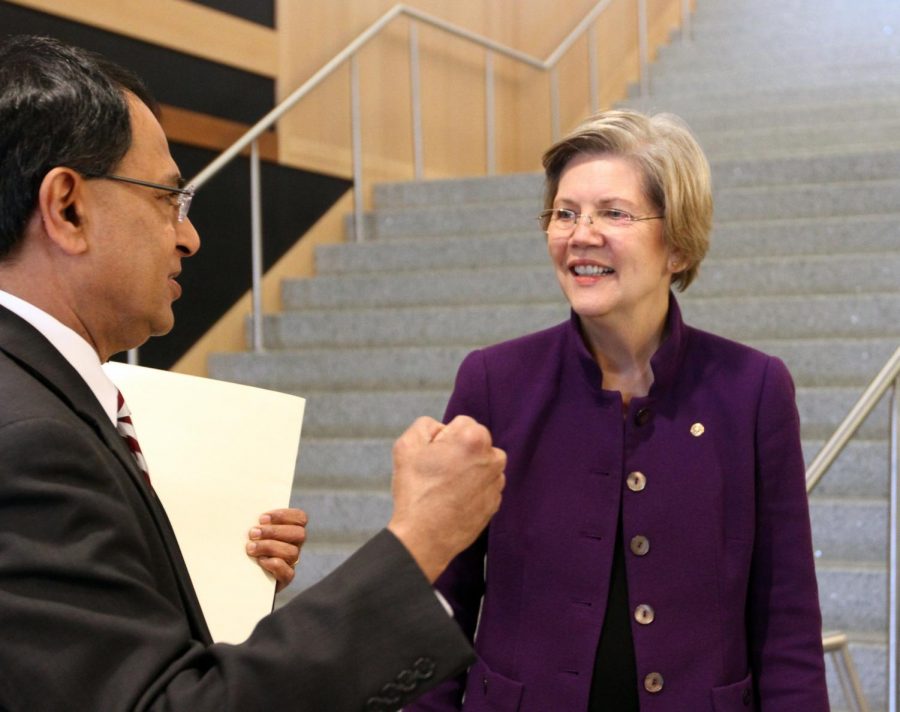With the primaries approaching rapidly, the question of what candidate to pick has become more fraught than ever, especially considering the populated field filled with many similar candidates.
For example, two top progressive candidates, Elizabeth Warren and Bernie Sanders, may seem virtually indistinguishable from each other upon initial inspection. Aside from the obvious difference of Warren’s gender, many view the two as having nearly identical campaigns – an observation which could not be further from the truth.
While both Warren and Sanders have embraced populist policies such as Medicare for All and increasing taxes on the wealthy, they both have distinct visions for the future of America. Warren’s vision, one based on vanquishing the chokehold of big business on the economy and consequently paving the path for disadvantaged Americans to rise financially, is unique due to her plans to implement it.
Unlike Sanders, Warren’s ideology is based on the restructuring of our current economic and governmental systems to afford rightful opportunities to citizens that have been previously denied them rather than the revolution he advocates for. While his narrative is commendable, what the country needs now is someone willing to work within the current political restraints and modify the system to better serve those who remain neglected by Washington. While perhaps not ideal, this is the only way to make the first steps towards large scale change in our country.
Warren, with her laudable goals aimed at relieving the untenable burden placed upon the lower and middle classes today and tempered by her impressive legal knowledge and experience needed to make these plans work, is the best candidate to achieve this.
The senator’s campaign is centered around her commitment to bringing financial stability to the middle and lower classes, an increasingly unrealistic dream for many Americans today. This is due to the widespread prevalence of obscenely large and profitable companies, and the consequent amount of control they hold over workers’ incomes and lives.
Large companies are given absurd exceptions, often bypassing paying any measure of federal income tax. NBC reported Amazon paid nothing in federal taxes. This is impossible for people earning minimum wages, a pittance compared to the “$11.2 billion in income last year.” To combat this, Warren introduced a new tax proposal that would affect companies with profits exceeding 100 million dollars. Her proposal is unique in its deliberate construction: the tax is designed to prevent companies from finding loopholes to avoid paying it.
Taking a strong stand against the blatant corruption exhibited by companies is nothing new for Warren, whose long legal career represents her continued fight for Americans who lack the privileges afforded to the rich elites of our country. Whether it was holding Wells Fargo and its CEO accountable for the massive scam it pulled, or working tirelessly during her time as the chief advisor of the National Bankruptcy Review Commission to protect the right of individuals to file for bankruptcy or even her crucial role in creating the Consumer Financial Protection Bureau amidst the fallout of the 2008 financial crisis, Warren has done incredible work to fight on behalf of the consumer.
This is not to say Warren’s entire record stands up to the test of ideological purity. In her work as a lawyer, she has occasionally argued on behalf of large corporations, in one case representing a steel conglomerate that was attempting to avoid paying retired miners by the justification of its bankruptcy. While this seems contradictory to her message of holding corporations accountable, Warren’s motivations lied in protecting the bankruptcy system, something which is vital for many individuals, especially in cases of medical bankruptcy. Another part of her history that is important to note was her claiming of Native American heritage, something she has since apologized for.
Ultimately, what separates Warren from the rest of the field is the plausibility of her proposed policies. One of her most well-known ones is centered around erasing the crippling and unmanageable burden of student debt, a seemingly audacious and lofty goal, but one Warren has turned into an actionable plan. Using money collected from increasing taxes on the super-wealthy and large corporations, Warren plans to “eliminat[e] up to $50,000 in student loan debt for every person with a household income of less than $100,000” as reported by the New York Times. This, I believe, is only a preview of the great changes Warren can make as president.
Srija Nagireddy is a Collegian contributor and can be reached at [email protected]





















Hailey • Feb 28, 2020 at 3:39 pm
The fact that she pretended to be indigenous for material gain for decades should be a disqualifier. It was a racist and disgusting thing to do especially within the context of this country’s history (and present). She is not absolved because she apologized, nor do you get to decide as likely a non-native that she is off the hook for it.